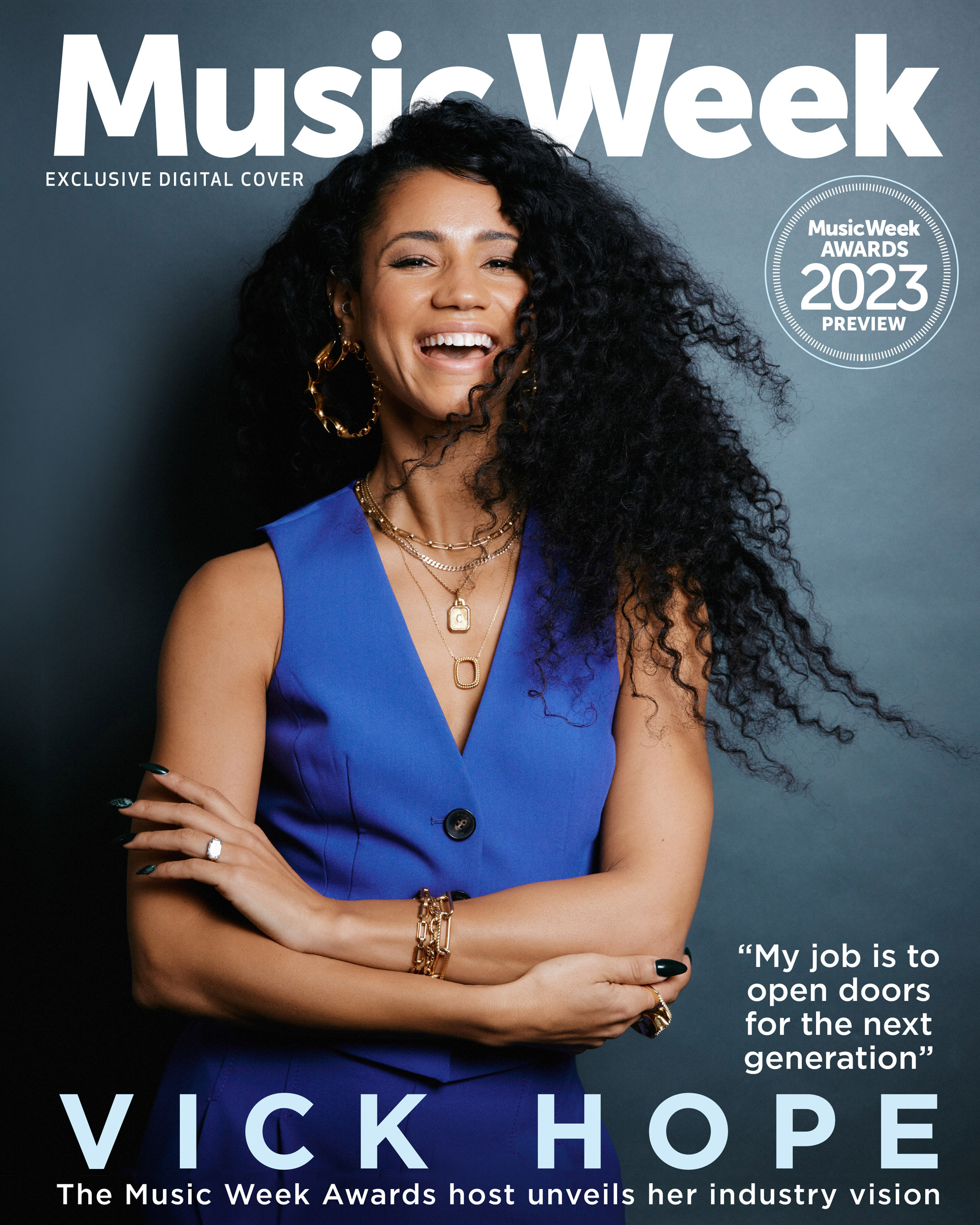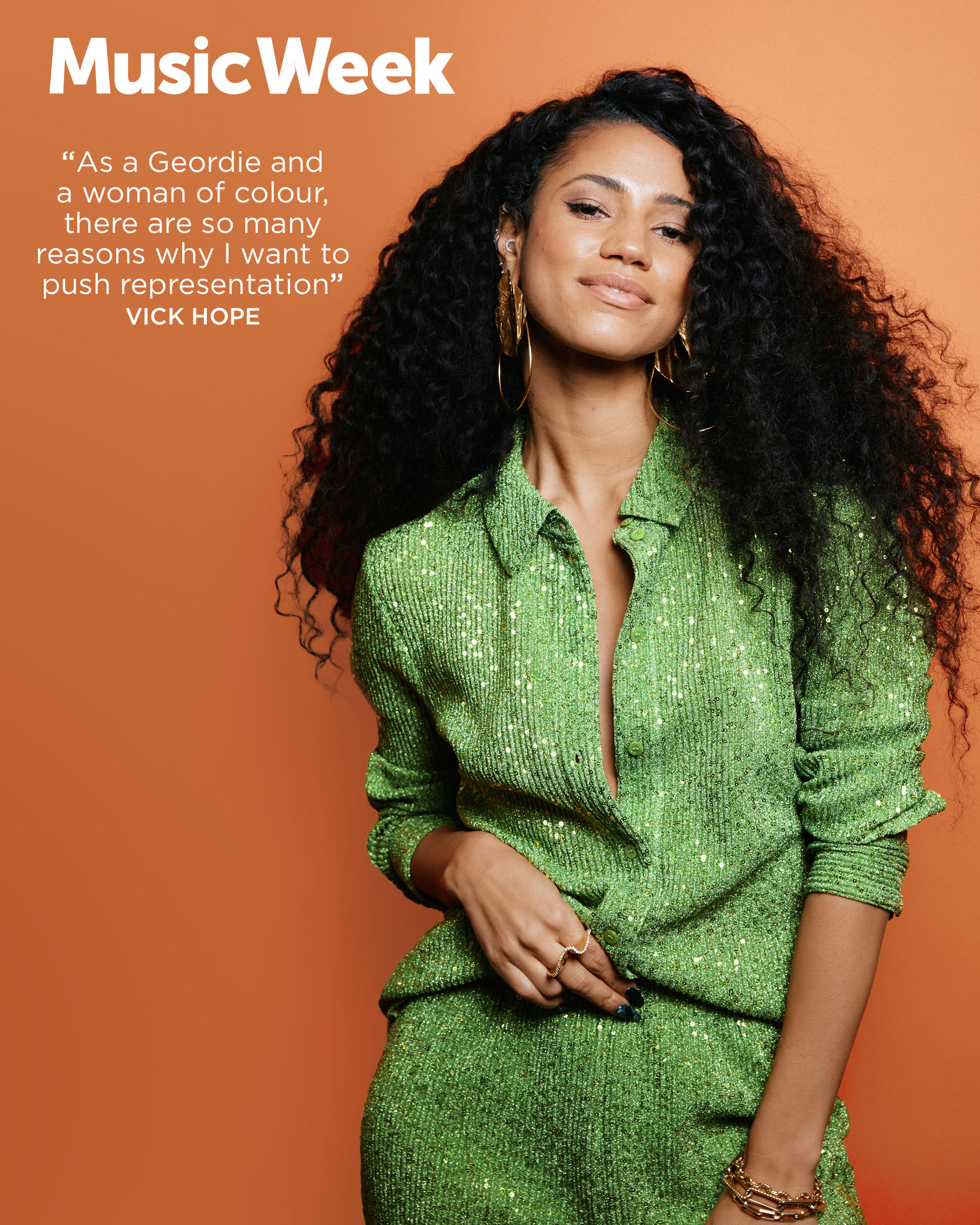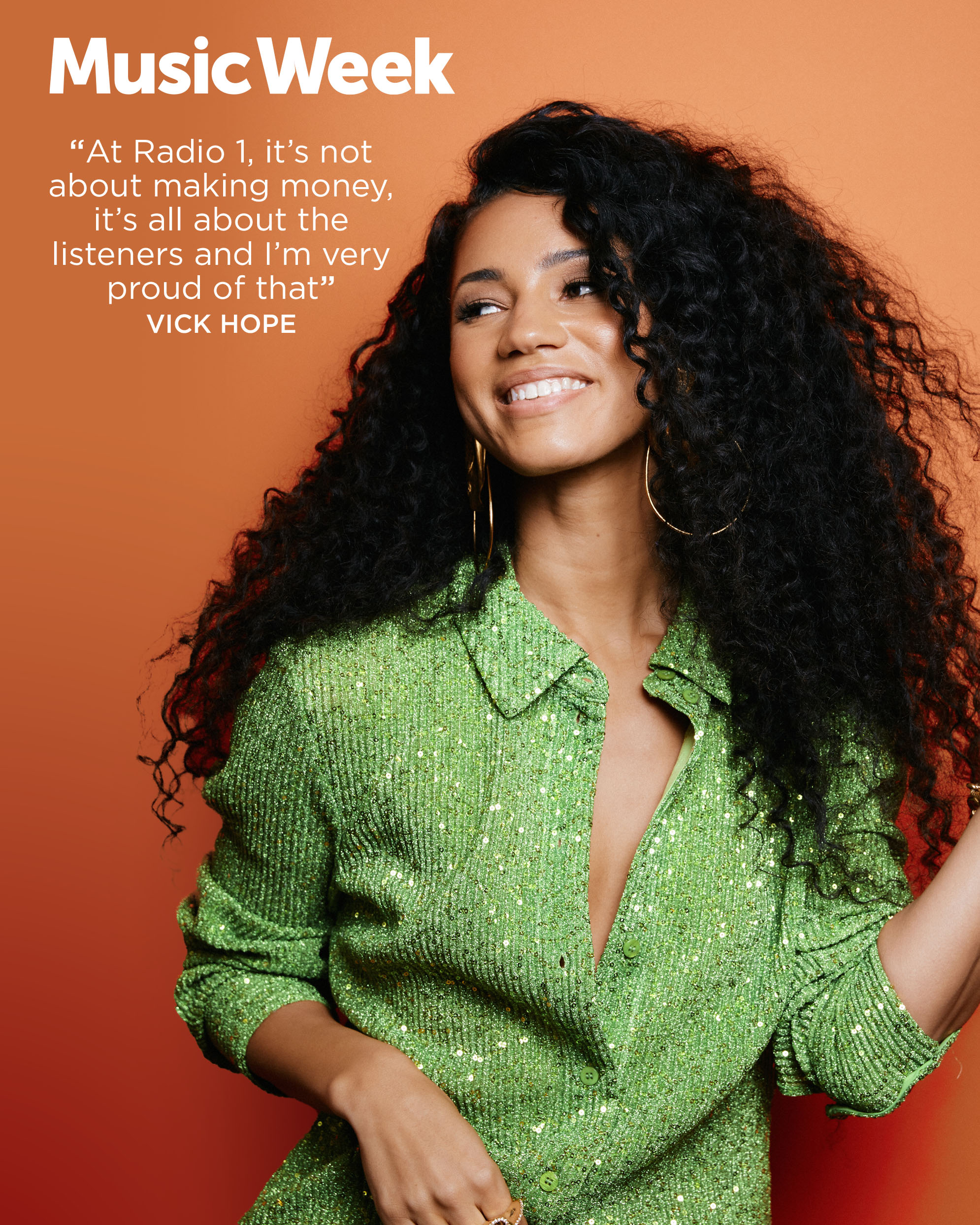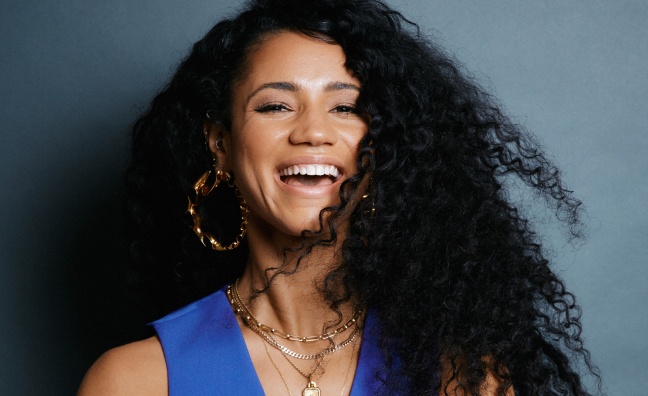As well as being a leading light of BBC Radio 1’s new generation of DJs, Vick Hope is a podcaster, presenter and writer. This time next week, she’ll be taking to the stage in front of the music industry, leading proceedings at the biggest ever edition of the Music Week Awards. To celebrate, we meet our host for a special preview interview and to talk breaking acts, supporting new talent on and off air and the fight for an equal playing field…
WORDS: MIRANDA BARDSLEY
PHOTO: SOFI ADAMS
“I see no reason why you have to limit yourself,” says Vick Hope, musing on her multifaceted career to date. “Life should be about trying stuff out and trying to have a good time with it.”
As a multilingual radio host, presenter and writer, Hope is what you might call a ‘jack-of-all-trades’, something she believes should be celebrated.
“I get really excited by loads of stuff, I have very wide-ranging interests and passions,” says the Newcastle-born DJ, who is fizzing with energy as we settle into an interview while she’s en route to Radio 1 HQ. “I remember when I was getting into my career people saying, ‘You need to make a decision, you need to streamline things a little bit, you can't just be a jack-of-all-trades.’ But I just don't think that's true.”
Hope has been blazing a trail through industry for over a decade now, and is one of BBC Radio 1’s best known voices, known for her three weekly shows, Going Home With Vick And Jordan - which she presents alongside sidekick Jordan North - Radio 1’s Life Hacks [with Katie Thistleton] and The Official Chart: First Look.
And now, to add another string to her industry bow, Hope will be taking to the stage to host the biggest edition of the Music Week Awards yet. Indeed, it will be her first time at the event full stop.
“I’m excited, I’ve never been to the Music Week Awards before, and I’ve heard it’s a great night,” she smiles. “Last year, when Radio 1 won the Radio Station Award, which was amazing, Jordan and I couldn't even go because we were on air! The station has very kindly given me a show off this year so I can host, so it’ll be great to see what it’s all about!”
Hope, whose Songs To Live By podcast explores the importance of Black music within society, is fully aware of the importance of the roles played by the executives that will fill Battersea Evolution in London on the night, too.
“On the radio, we get to play all this music and it's amazing, but it’s important to remember the process that goes into that music, the creativity, the artistry, the organisation that goes into the tunes, the festivals and gigs we love going to,” she says. “These are all things that my life essentially revolves around.”
Beyond music, Hope is fiercely committed to empowering those coming up behind her. Accompanying her Life Hacks show, she has also created the Life Hacks Wellbeing Kit on Radio 1, which offers advice to younger adults covering everything from education to money to relationships.
“I want to give back, even if we’re just talking about a subject which one person is confused about,” she explains. “If it makes them feel a little less alone, then that means the world.”
Hope has also written two children’s books and hosts the Bookshelfie podcast for the Women’s Prize for Fiction. This ethos of empowering younger generations is carried into her writing too.
“My kids books are all about using your voice, standing up for what you believe in and finding your creative passions and following them,” she says. “With any of the work I am doing, I just want to put a little bit of good in the world.”
Before she does just that at the Music Week Awards, we go deep with Hope on why Radio 1 is essential for the industry, supporting emerging artists and her plans to steer the show on the music business’ most exciting night of the year…

First of all, how are you feeling about being up there in front of the whole music industry?
"Well, when you put it like that, it's a little nerve-wracking! Often, when you do ceremonies, you can hide the nerves, but I feel like the music industry knows what those nerves look like. At the end of the day, though, everyone wants to have a good time, so I can't imagine it's going to be a highly critical audience in that respect. I'll see some familiar faces and it’s a room full of people who are no strangers to getting up on stage and being around people they look up to, so we're all in it together. Everyone's worked really hard to get to this point, so there will probably be a lot of blowing off steam.”
As a host, what should we expect from you from the night?
"Energy and good vibes, that's my modus operandi. It’s why we go on the radio every day. Just to warn you, I won't be bringing the punch lines, there won't be anyone who needs to be scared that they're in the firing line of some harsh gag! It would be very inauthentic if I did that, I'll just bring my happy self and the utmost respect for the people in the room.”
What excites you the most about the industry right now?
"The fact that festivals are upon us. For me, festivals are the best time to discover new artists. You can be watching the biggest artists in the world and it just might so happen that on the stage next to them is someone you've never heard of and you end up wandering over there. Radio 1 will be at Glastonbury, in Ibiza, there's Latitude festival and of course, the biggest one for us, Radio 1’s Big Weekend. I'm really excited about all of that.”
How does Radio 1 support emerging artists best?
“I'm always very proud of BBC Introducing, and Jordan and I have a BBC Introducing Artist Of The Week on our show. They’re unsigned and can come from any of our regions, which is really important. I'm always so excited when we get artists from the North East, which is where I'm from. We’re always proud when any artists come out of our area. Like Sam Fender, every time he plays in Newcastle or even London, I get tickets for my family and we all go and see him. There's real local pride! Radio 1 has these adverts that show an artist's trajectory, from their first play as a BBC introducing artist, to playing in the Live Lounge, to Big Weekend, all the way to headlining Glastonbury or announcing their No.1. Those journeys are so invigorating, and knowing that the seeds are sown in the place that we work is really nourishing.”

There's been a lot of change under Aled Haydn Jones at Radio 1 since he came in. Do you think the station’s role in the industry has changed too?
“I always looked at Radio 1 as a bastion of new music, I listened to it religiously when I was growing up, I would sit in my room and write out in my notebook what was at which number in the chart every Sunday. I am still obsessed and have always been in awe of the station’s output. Take Clara Amfo’s Future Sounds, she plays the freshest music and she’s amazing, she knows music inside and out. I'm also a huge dance fan and I think that Radio 1’s dance output – and this is under Aled – is brilliant. Plus, Radio 1 Relax is also a beautiful tool for young people when they need it most. We come into our meetings every day and the one question we ask is, ‘How do we best serve 15 to 25 year olds?’ That's it. It's not about how we make more money, it’s all about the listeners, the young people in this country who deserve to be informed and entertained. I'm very proud of that.”
How do you gauge the kind of music your listeners want to hear?
“The music team at Radio 1 have data and analysis to gauge how songs are doing, but the response we get is almost entirely through texts and social media. One way of testing new music is that, every week, we have one tune we choose ourselves, and two free plays, which can be something we've heard on a specialist show or on a new playlist. With the free plays, we can take more risks and there are certain songs that just get people talking. For instance, we had Mura Masa’s Whenever I Want on recently, which was divisive because it's so chaotic and experimental. But I love Mura Masa, and sometimes you’ve got to stick to your guns and say, ‘You know what, I love this track.’ I love when people at the beginning of the week are like, ‘What is this?’ And by the end they're really into it.”
When Music Week spoke to Aled Haydn Jones last year, he described TikTok as a way to gain popularity, but not a competitor to Radio 1. Do you agree?
“Well, I am not on TikTok and probably never will be. But that's not a slight on it at all, I think it’s a really effective platform and it’s something our audience connects to and loves. We use it on our show quite a bit, if something is trending or going viral, we’ll draw from that, it might spark a bigger conversation. We also had a TikTok takeover at Christmas which was great, and we’ll be doing TikToks around Dundee at Big Weekend because they get great traction and bring fans to the music. So it's not one or the other, I agree with Aled, it all works together.”
What impact do you think TikTok has on the music industry and upcoming artists?
“I think it helps artists, it can boost a song that might not have been heard or make a song by an unsigned artist a huge hit. The downside of that is the artist may not have a follow-up hit, but that’s just because things go viral so randomly. What I think labels, artists and audiences need to do is manage their expectations about the impact that TikTok has, we mustn't see it as the one parameter of success, because it's not.”

Do you think issues of equality and diversity are being acknowledged and acted upon enough in the music industry and in radio specifically?
“Let's be honest, are we where we need to be? Of course not, we've still got work to do. That's part of the reason I'm here. As a Geordie and a woman of colour, there are so many reasons why I want to push representation. I always think that my job is to help open doors for the next generation. When I was coming up, so many opportunities were in London, and I didn't have anywhere to stay. How was I supposed to pay my rent if I wasn't getting paid? Addressing issues like that chasm between the North and South is something Radio 1 are really trying to do with BBC Introducing. Also, with Big Weekend, we're going to cities where there isn't necessarily a big venue where artists would usually be coming. We want to make music accessible to everyone, because it should be. We've been saying this for decades, but opportunities are still not equal for women, especially for older female artists. We still have work to do, we can all be better, so we’re just trying.”
Finally, what do you want to see more from the music industry?
“That's a hard one. I want to see more diverse voices. I love when music and performances tell stories that we've never heard or seen before. That comes from embracing differences. I'm a big fan of when artists are experimental or you see some of their culture come through, cultures that might not get as much representation. Even something like when Little Simz did Woman [Ft Cleo Sol], and she was describing all different female blackness, different African nations, stuff that I really recognised but had never heard depicted like that. As a Nigerian, it made me feel so happy and validated. I love when the music industry allows for there to be nuance and for people to tell their story. My message to the business is to allow those musicians to breathe and to be themselves. Trust their authentic voices.”









